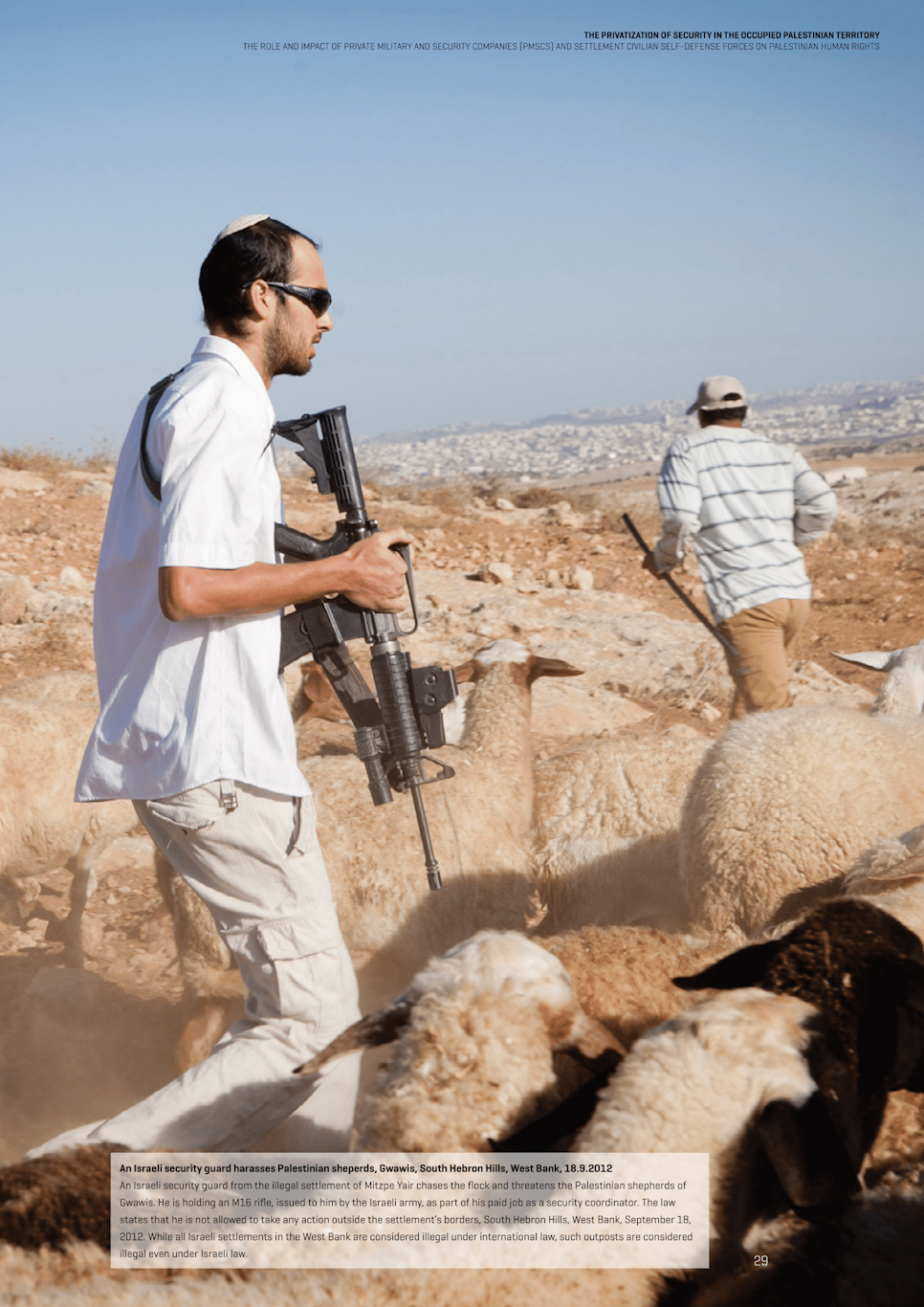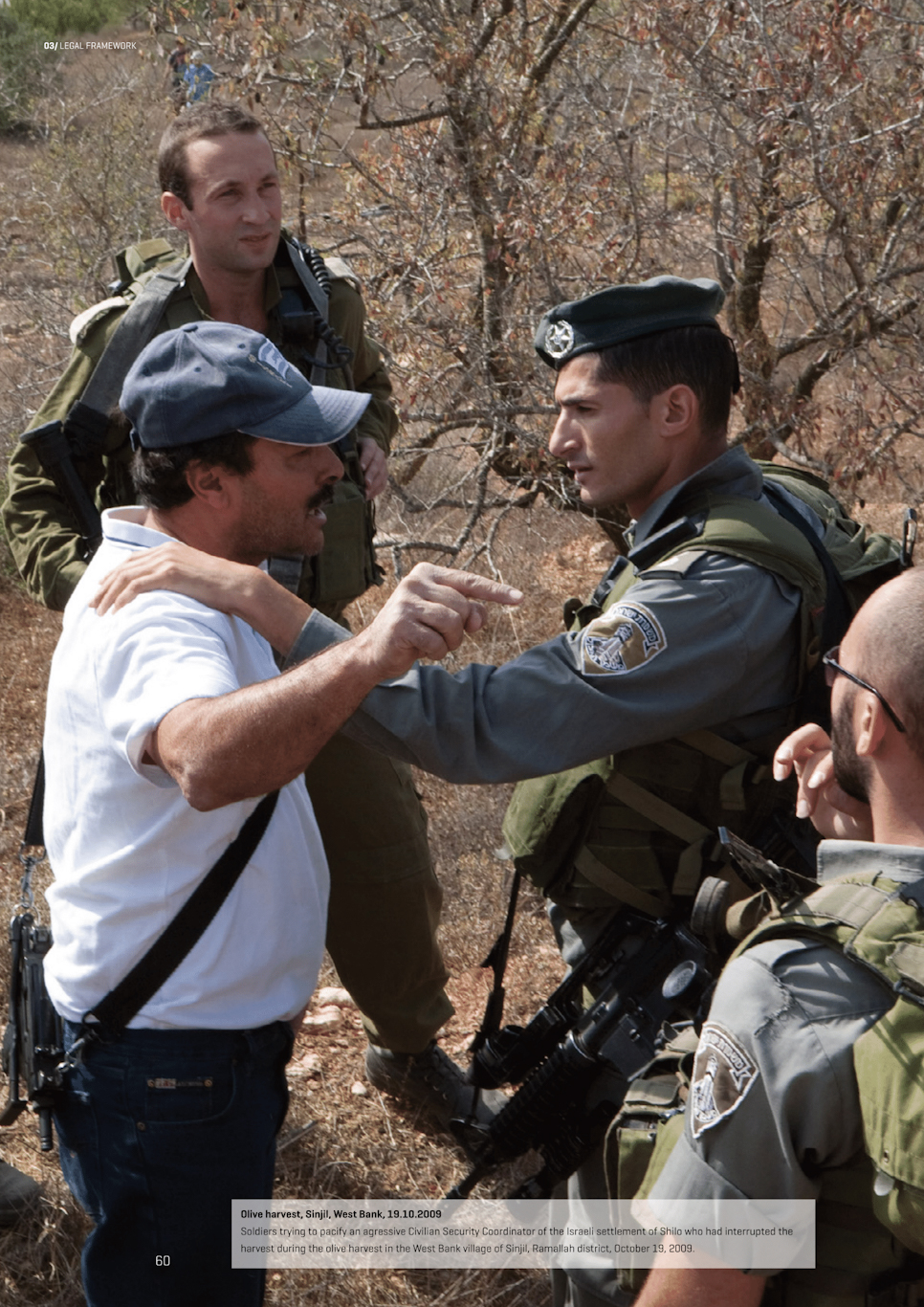Private security at the checkpoints
The process of transferring military operations to private security contractors commenced during the Second Intifada (Palestinian uprising against the Israeli state) from 2000 to 2005. An Israeli government decision handed over the powers to civilian and police control in 2005 and established the Crossing Points Authority as the body responsible for maintaining the checkpoints.
The Ministry of Defense (MoD) stated the reasoning behind this decision was to preserve Palestinians’ “fabric of life.” The fabric of life refers to the basic minimum conditions a person needs to work, study, and live. Dr. Shir Hever, a political economist and author of the book “The Privatisation of Israeli Security,” explained Israel’s security interest in protecting Palestinians’ fabric of life as arising not out of moral duty but rather as a diplomatic strategy. “The whole point is that the Israeli security operations need to disrupt that fabric as little as possible in the fewest instances possible because this impacts the Israeli image abroad,” Hever told MintPress News.
“The presence of 18-year-old soldiers in the checkpoints, where the soldiers are not trained and not experienced in dealing with civilian populations, causes embarrassing issues,” Hever continued. In order for the MoD to avoid potential gaffes on the world stage, trained security personnel replaced the army.
Yet security professionals appear just as inept at interacting with civilians as does the Israeli army.
Maram Saleh Hassan Abu Ismail was attempting to cross the Qalandiya checkpoint with her teenage brother, Ibrahim Taha, when the siblings were shot dead by two civilian security guards on April 27, 2016. Israel Police claimed the woman threw a knife at an officer, prompting the fatal shooting. A police investigation was opened and abruptly closed the following Augustwith no indictments.
This is just one of many violent incidents perpetrated by private security guards against Palestinians at checkpoints, settlements, and various Israeli public places. The Israeli government’s objective for privatization was for more professional interaction between Palestinians and security forces. But Dr. Hever explained that the way privatization was structured actually eliminated all interaction. “Everything’s done remotely and mechanically, meaning there’s a voice coming from the wall telling you to put your bag into the machine, put your identity card into the slot, move through the turnstile, and you don’t see anybody. You don’t speak with anybody,” Hever said.
The companies operating at the checkpoints
According to Machsom Watch, an Israeli women’s organization monitoring the checkpoints, there are 593 checkpoints in the West Bank — including 23 border checkpoints. The border checkpoints have been undergoing privatization efforts since 2006. Research center Who Profitsdetails all of the checkpoints along the Apartheid Wall — which the Israeli government refers to as the Separation Barrier, between the West Bank and 1948-Occupied Palestine (or modern-day Israel) — that are to be privatized. Fifteen checkpoints are currently privatized and one is partially privatized.
The following are the companies involved in the checkpoints:
Sheleg Lavan
Sheleg Lavan is an Israeli firm providing cleaning and security services. In 2019, it won a tender from the Israel Police to provide security operations to the area of the Apartheid Wall surrounding Jerusalem (Israel Police declined to provide an interview for this story; Sheleg Lavan and the Crossing Points Authority did not respond to requests for comment).
The company has inspectors and guards at the following checkpoints in Gaza and the West Bank: Tarqumia, Meitar, Maccabim, Habika, Eliyahu, Hashmonaim, Sha’ar Efraim, and Kerem Shalom. The company’s revenue stands at 600 million shekels or nearly $190 million.
Modiin Ezrachi
Modiin Ezrachi is one of the largest Israeli security companies, with a revenue of 700 million shekels or nearly $220 million. It has security guards and inspectors at the following checkpoints in the West Bank, Gaza, and Occupied East Jerusalem: Gilboa, Reihan, Eyal, Hotze Shomron, Qalandiya, Sheikh Sa’ad, Anata, and Al-Jib. The two security guards responsible for Abu Ismail and Taha’s deaths were employed by Modiin Ezrachi.
G1 Secure Solutions
This Israeli security firm’s luggage- and body-scanning machines are used at the Erez checkpoint in Gaza, and at the Qalandiya, Bethlehem and Sha’ar Efraim checkpoints in the West Bank. The company had a contract with the Israel Civil Administration (ICA) for maintenance of metal gates designed by U.S. corporation Rapiscan and installed at ICA checkpoints. The contract was renewed until April 2018. G1 Secure Solutions did not respond to comments on whether it still retains this contract. The company’s current revenue is 821.4 million shekels or roughly $260 million.
Malam Team
Malam Team is an Israeli information technology firm. The company has an estimated revenue of $711 million shekels or $220 million. Malam Team’s subsidiary, Eltel, has scanning equipment at several West Bank checkpoints and at the Erez checkpoint in Gaza. It also maintains scanning equipment in the following checkpoints in the West Bank and Gaza: Hotze-Shomron, Eyal, Barta’a, Eliyahu, Jalme, Metar, Metzudut Yehuda, Sha’ar Efraim, Maccabim, Tarqumya, and Habika.
T&M Protection Resources Holdings Israel
This Israeli security company won a tender published by the Israel Police in 2019 for nine checkpoints in Jerusalem near the Apartheid Wall. These checkpoints are: a-Sheikh Sa’ed, a-Sawahrah, a-Za’ayem, Mazmuriyeh, Ein Yael, The Tunnels, Anata, Checkpoint 300, and a-Zaitun. The firm also provides guarding services to the Crossing Points Authority.
T&M Israel is the highest-ranked company in Israel’s security and cleaning industry. Its 2021 revenue stands at 1.175 billion shekels or $367 million. The company’s CEO, Shimon Talmor, served as a combat fighter in the Israeli army.

Credit | International Institute for Nonviolent Action | Creative Commons
Private security in the settlements
Many of the private companies operating at the checkpoints also provide security services to the illegal Israeli settlements in the West Bank. In 2008, the Israeli military decided to transfer the security of 40 settlements to private security personnel. The military attributed its decision to the installation of army equipment having made the presence of soldiers in the settlements obsolete, and maintained that trained professionals would be able to offer better security than soldiers.
Modiin Ezrachi, G1 Secure Solutions, Malam Team, and T&M Israel are all involved in the settlements.
Modiin Ezrachi provides security to settlements in East Jerusalem, including working with the settler organization El’ad; nine settlements in the West Bank; and has been contracted by the Mount Hebron and Mateh Benjamin settlement councils. Settlement councils are Israeli government-run institutions charged with running the affairs of Israeli settlements on Palestinian land, including the hiring of contractors. Most of Israel’s illegal settlements are managed by a group of representatives known as regional councils. The company provides security to businesses in the Mishor Adumim industrial zone and the construction sites in the Beitar Illit settlement.
G1 Secure Solutions provides security to eight settlements in the West Bank and East Jerusalem. Malam runs an IT services project employing orthodox Jewish women, called Ma’alot in Beitar Illit. And T&M Israel provides security, guarding and escorting services to settlers in East Jerusalem.
The following security companies also operate in the settlements and industrial zones in the West Bank and East Jerusalem.
Reshef Security
This Israeli security firm operates in 22 settlements in East Jerusalem, the West Bank and the occupied Syrian Golan. Reshef Security won a tender issued by the Israel Nature and Parks Authority in 2019 for maintaining security at nine sites in the Golan and 10 in the West Bank. It works with the Ministry of Education to provide security to educational facilities in the West Bank. And Reshef Security’s National Center for Earthquake Prediction and Control has sensors installed in 10 settlements in the West Bank.
Tzevet 5
Tzevet 5 provides security services to 13 settlements, settlement councils, and industrial zones in the West Bank. In 2019, Who Profits researchers documented Tzevet 5 employees guarding the Og sewage purification plant located in the Jordan Valley in the West Bank.
Moked Matara
This Israeli security and surveillance company’s clientele includes seven settlements in the West Bank. The company’s top executives are all veterans of the Israeli army.
According to his LinkedIn profile, chairman Yossi Refaelov served as a Combat Engineering Brigade commander and Special Operation Unit commander in the Israel Defense Forces. Yossi Arbiv is Moked Matara’s business development manager and “served as a Deputy in one of the Combat Engineering Battalions, as a commander of a Bomb Disposal Unit, as a Special Operation Unit deputy commander and as operations officer of Combat Engineering Corps.” Atai Shelach has served as the company’s director since 2014. Shelach’s Linkedin profile boasts “27 years of military operational experience. He served as the Commander of the special Elite Combat Engineering Unit of the Israel Defense Forces, as Head of the IDF’s VIP Protection Unit, as Chief, IDF’s CBRN Center and as Second in Command of the IDF engineering corps.”
Nof Yam Security
Nof Yam provides security services to four settlements in the West Bank: Ma’ale Adumim, Efrat, Har Gilo, and Elazar. According to Who Profits, “[t]he company’s directors and consultants are former high-ranking officers in the Israeli military and security forces.”
Ben Security
This Israeli security firm operates in eight settlements in East Jerusalem and the West Bank. Ben Security ranked 10th in Israel’s index of the leading security and cleaning companies. The company’s estimated revenue is 170 million shekels or just over $50 million.
Galshan Marketing Human Resources Guarding & Security
Galshan is a private security company whose settlement clientele includes Beit El Local Council, Mevaseret Zion Local Council, Mateh Yehuda Regional Council, Gush Etzion Regional Council, and Beitar Illit.

Credit | International Institute for Nonviolent Action | Creative Commons
From military head to security firm CEO
It’s no coincidence that many of these companies’ top management officials were once senior military officers. Dr. Hever explained the traditional career step for most retired Israeli army generals is the private sector:
The Israeli military has a very low retirement age — between 40 and 45 — so these officers have time for a second career. That second career explains a lot of why these security companies are so prosperous, and why so many of them are getting so many contracts, because that’s the employment option for these retired generals.”
With the rise of high technology, ex-generals became less desirable as company CEOs, with preference given to engineering and tech experts instead. “The options for these retired generals are narrowing and they either become arms dealers or they set up security companies,” Hever said.
But for Palestinians, whether it’s a soldier or private security guard stationed at a settlement or checkpoint doesn’t matter.
“What do Palestinians care who looks at their papers?” Hanna Barag, an activist with Machsom Watch, told MintPress.
The psychological effect that you have to go through a checkpoint with papers when you never know what’s going to happen any day of the year, any minute, and that you never know if you’re going to get these papers back…this is the real occupation, sitting in the fact that you have no freedom of movement.”
Feature photo | An armed Israeli stands atop a water tower in a settlement near the West Bank village of Um Fagarah, South Hebron Hills, West Bank. Oren Ziv | Activestills
Jessica Buxbaum is a Jerusalem-based journalist for MintPress News covering Palestine, Israel, and Syria. Her work has been featured in Middle East Eye, The New Arab and Gulf News.




Geen opmerkingen:
Een reactie posten